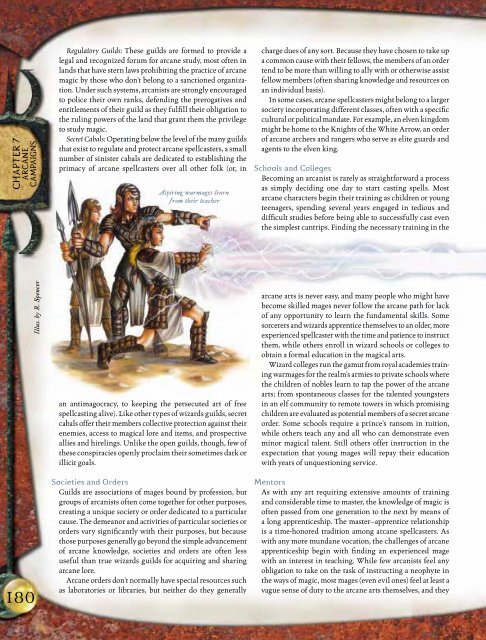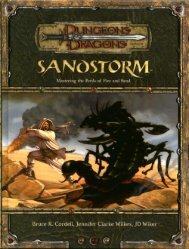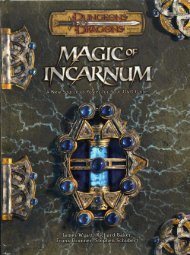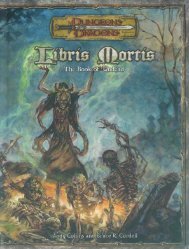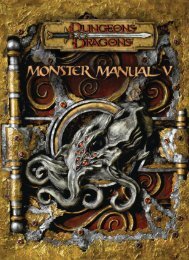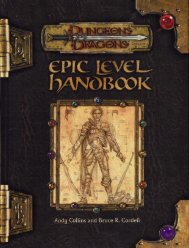Complete A..
Complete A..
Complete A..
- No tags were found...
Create successful ePaper yourself
Turn your PDF publications into a flip-book with our unique Google optimized e-Paper software.
CHAPTER 7ARCANECAMPAIGNSRegulatory Guilds: These guilds are formed to provide alegal and recognized forum for arcane study, most often inlands that have stern laws prohibiting the practice of arcanemagic by those who don’t belong to a sanctioned organization.Under such systems, arcanists are strongly encouragedto police their own ranks, defending the prerogatives andentitlements of their guild as they fulfill their obligation tothe ruling powers of the land that grant them the privilegeto study magic.Secret Cabals: Operating below the level of the many guildsthat exist to regulate and protect arcane spellcasters, a smallnumber of sinister cabals are dedicated to establishing theprimacy of arcane spellcasters over all other folk (or, inAspiring warmages learnfrom their teachercharge dues of any sort. Because they have chosen to take upa common cause with their fellows, the members of an ordertend to be more than willing to ally with or otherwise assistfellow members (often sharing knowledge and resources onan individual basis).In some cases, arcane spellcasters might belong to a largersociety incorporating different classes, often with a specificcultural or political mandate. For example, an elven kingdommight be home to the Knights of the White Arrow, an orderof arcane archers and rangers who serve as elite guards andagents to the elven king.Schools and CollegesBecoming an arcanist is rarely as straightforward a processas simply deciding one day to start casting spells. Mostarcane characters begin their training as children or youngteenagers, spending several years engaged in tedious anddifficult studies before being able to successfully cast eventhe simplest cantrips. Finding the necessary training in the180Illus. by R. Spenceran antimagocracy, to keeping the persecuted art of freespellcasting alive). Like other types of wizards guilds, secretcabals offer their members collective protection against theirenemies, access to magical lore and items, and prospectiveallies and hirelings. Unlike the open guilds, though, few ofthese conspiracies openly proclaim their sometimes dark orillicit goals.Societies and OrdersGuilds are associations of mages bound by profession, butgroups of arcanists often come together for other purposes,creating a unique society or order dedicated to a particularcause. The demeanor and activities of particular societies ororders vary significantly with their purposes, but becausethose purposes generally go beyond the simple advancementof arcane knowledge, societies and orders are often lessuseful than true wizards guilds for acquiring and sharingarcane lore.Arcane orders don’t normally have special resources suchas laboratories or libraries, but neither do they generallyarcane arts is never easy, and many people who might havebecome skilled mages never follow the arcane path for lackof any opportunity to learn the fundamental skills. Somesorcerers and wizards apprentice themselves to an older, moreexperienced spellcaster with the time and patience to instructthem, while others enroll in wizard schools or colleges toobtain a formal education in the magical arts.Wizard colleges run the gamut from royal academies trainingwarmages for the realm’s armies to private schools wherethe children of nobles learn to tap the power of the arcanearts; from spontaneous classes for the talented youngstersin an elf community to remote towers in which promisingchildren are evaluated as potential members of a secret arcaneorder. Some schools require a prince’s ransom in tuition,while others teach any and all who can demonstrate evenminor magical talent. Still others offer instruction in theexpectation that young mages will repay their educationwith years of unquestioning service.MentorsAs with any art requiring extensive amounts of trainingand considerable time to master, the knowledge of magic isoften passed from one generation to the next by means ofa long apprenticeship. The master–apprentice relationshipis a time-honored tradition among arcane spellcasters. Aswith any more mundane vocation, the challenges of arcaneapprenticeship begin with finding an experienced magewith an interest in teaching. While few arcanists feel anyobligation to take on the task of instructing a neophyte inthe ways of magic, most mages (even evil ones) feel at least avague sense of duty to the arcane arts themselves, and they


